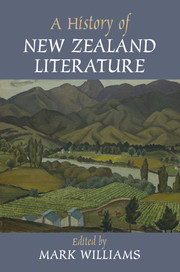Book contents
- Frontmatter
- Contents
- Notes on Contributors
- Acknowledgments
- Introduction
- PART I 1760–1920
- PART II 1920–1950
- PART III 1950–1972
- PART IV 1972–1990
- PART V 1990–2014
- 20 ‘While History Happens Elsewhere’: Fiction and Political Quietism, 1990–2014
- 21 Anecdote in Post-1990 New Zealand Poetry
- 22 From Exploring Identity to Facing the World: Drama Since 1990
- 23 From Meadow to Paddock: Children's and Young Adult Literature
- 24 ‘Nafanua and the New World’: Pasifika's Writing of Niu Zealand
- 25 New Zealand Literature in the Program Era, or, the Spirit of Nationalism Past
- Index
20 - ‘While History Happens Elsewhere’: Fiction and Political Quietism, 1990–2014
from PART V - 1990–2014
Published online by Cambridge University Press: 05 April 2016
- Frontmatter
- Contents
- Notes on Contributors
- Acknowledgments
- Introduction
- PART I 1760–1920
- PART II 1920–1950
- PART III 1950–1972
- PART IV 1972–1990
- PART V 1990–2014
- 20 ‘While History Happens Elsewhere’: Fiction and Political Quietism, 1990–2014
- 21 Anecdote in Post-1990 New Zealand Poetry
- 22 From Exploring Identity to Facing the World: Drama Since 1990
- 23 From Meadow to Paddock: Children's and Young Adult Literature
- 24 ‘Nafanua and the New World’: Pasifika's Writing of Niu Zealand
- 25 New Zealand Literature in the Program Era, or, the Spirit of Nationalism Past
- Index
Summary
The reception of two Booker Prizes, awarded almost thirty years apart, offers a position from which to assess mutations in literature's place in cultural politics from the postcolonial 1980s to the globalised 2000s. Keri Hulme's the bone people (1983; Booker winner 1985) is concerned with spiritual transformation and settled location, a tale centred on a few individuals and their fractured relation to the Māori world. Writing in the New Zealand Listener Joy Cowley greeted the novel as ‘textured with the rough and smooth of our own being’. ‘We have’, she affirms, ‘known this book all our lives’. Hulme's achievement, in this review, is to have ‘given us – us’.
Three decades on, and Eleanor Catton's The Luminaries (2013; Man Booker winner 2013), the longest book to date to have won the prize, and a multiperspectival, many-charactered exploration of materials, histories, and travels, was received in the same magazine as a strangely empty vessel. ‘It's easy to be distracted from [The Luminaries’] lack of ambition where it really matters’, the reviewer, Guy Somerset, wrote; Catton, for him, had ‘set herself the creative writing exercise to end all creative writing exercises’.
Catton's enthusiastic reception elsewhere leaves Somerset's sceptical view untypical of its time; his terms of dissent, however, reproduce a register from the first decade of the twenty-first century in New Zealand and elsewhere. Did culture lose the culture wars? Was the very commercial and critical triumph of The Luminaries a sign of literature's full incorporation into the culture industry? Catton's success may well have been literature's failure, as the promise of the novel – for political commentary and critical reflection – is broken in favour of the emptiness of the exercise. Intervening in the aftermath of the 1951 Waterfront Lockout and speaking to a farmer-dominated, socially conservative New Zealand, Robert Chapman demanded that ‘the artist must sound his trumpet of insight until the walls of Jericho – the pattern as it is – fall down’. Bill Pearson's ‘Fretful Sleepers’ published in the same year cried out for the country's ‘aching need for art’ with which to work up ‘the threadbare constitution of social behaviour’. This tradition, whatever feminist and postcolonial modifications came in along the way, carried itself through to accounts of the bone people.
- Type
- Chapter
- Information
- A History of New Zealand Literature , pp. 291 - 310Publisher: Cambridge University PressPrint publication year: 2016
- 2
- Cited by



